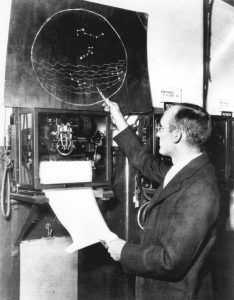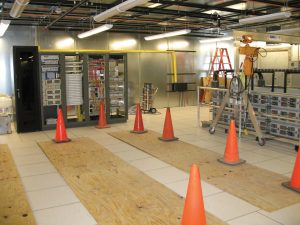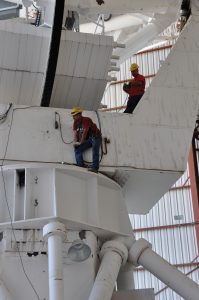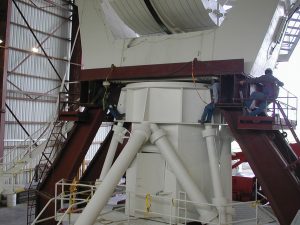Karl Guthe Jansky joined the staff of the Bell Telephone Laboratories in Holmdel, New Jersey in 1928. While hunting for radio static for Bell Labs, Jansky made the surprise discovery of radio waves coming from the center of our Milky Way Galaxy. In this photo, he is standing under a rough map of the night sky and pointing to the constellation of Cassiopeia. The wavy lines track the radio emissions he discovered on the chart paper, which also line up with the disk of our Galaxy, the Milky Way.


Karl Jansky and his Merry-go-Round
Karl Guthe Jansky is known as the father of radio astronomy, because in 1933 he discovered that the center of our Milky Way Galaxy emits radio waves. He was not an astronomer, however. He was a young engineer with Bell Laboratories tasked with identifying sources of static for their overseas radio communications. He built this rotating antenna to get all-sky coverage at their chosen frequency of 20.5 MHz (wavelength about 14.5 meters), and it quickly got the nickname of “Jansky’s Merry-go-round.” With it, he picked up thunderstorms and a strange hiss that moved throughout the day. He eventually figured out that it was coming from the direction of Sagittarius, behind which lies the heart of our Galaxy.

Portrait of Karl Jansky
Karl Guthe Jansky was born in Norman, Oklahoma on October 22, 1905 and graduated with a degree in physics from the University of Wisconsin. He joined the staff of the Bell Telephone Laboratories in Holmdel, New Jersey in 1928. While hunting for radio static for Bell Labs, Jansky made the surprise discovery of radio waves coming from the center of our Milky Way Galaxy. Jansky wanted to investigate the radio waves from the Milky Way Galaxy in more detail. He proposed to Bell Labs to build a 100 foot (30 meter) diameter dish antenna. But Bell Labs had the answer they wanted about static: the static was not a problem for transatlantic radio communication. Jansky was assigned to another project and did no more radio astronomy. He died on February 14, 1950.

WIDAR Under Construction
As part of the decade-long upgrade to the Very Large Array, an enormous room inside the Control Building was shielded in copper and given a raised floor to begin installation of the VLA’s new supercomputer known as WIDAR (Wideband Interferometric Digital ARchitecture). It is a method for digital correlation of very wideband signals from a radio interferometer. Data are digitally filtered and tuned down by ten percent into lower rate sub-bands which are separately cross-correlated and integrated before being seamlessly stitched together to yield the final wideband spectrum.

Maintenance of a VLA Antenna
The 28 antennas at the Very Large Array (VLA) each take turns coming into the Antenna Assembly Building, or Barn, for routine maintenance. Telescope technicians carefully test and service these 230-ton telescopes.

Splitting a VLA Antenna in Half
Over time, the azimuth bearing of a Very Large Array antenna needs cleaning out and repairing. Here, technicians align the upper, dish half of the antenna on the dark platform that will support it after its base is pulled out from under it by the Transporter.





